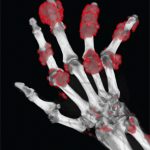Abstract 0683—Pharmacokinetics of Pegloticase and Methotrexate Polyglutamate(s) in Patients with Uncontrolled Gout Receiving Pegloticase and Co-treatment of Methotrexate: This study evaluated systemic exposures of pegloticase and methotrexate polyglutamate(s) in uncontrolled gout patients receiving pegloticase and methotrexate, and evaluated the effect of methotrexate. Treatment with 8 mg of pegloticase via IV every two weeks in combination with 15 mg of oral methotrexate weekly was associated with an improved response rate for pegloticase in patients with uncontrolled gout.
Abstract 0685—The Impact of Azathioprine on the Frequency of Persistent Responsiveness to Pegloticase in Patients with Chronic Refractory Gout: The goal of this study was to determine whether co-therapy with azathioprine would increase the frequency of chronic refractory gout patients who had persistent urate lowering from pegloticase therapy. The researchers concluded azathioprine can be used safely in subjects with chronic refractory gout and appears to increase the frequency of subjects experiencing long-term lowering of serum urate.
Abstract 0648—Dual Energy CT Has Additional Prognostic Value over Clinical Measures in Gout Including Tophi: Best Evidence Synthesis
Dr. Craig: “A very nice summary of published evidence in the use of DECT in gout, including its responsiveness to therapy, prognostic value and validity.”
Abstract 0681: Gout and Serum Urate Levels Are Associated with Lumbar Spine Monosodium Urate Deposition and Chronic Low Back Pain: A Dual-Energy CT Study
Dr. Craig: “An intriguing, albeit small, study looking at MSU deposits in the lumbar spine, showing higher rates of MSU deposits detected by DECT in gout populations vs controls, and possible association with low back pain.”
Abstract 0662—Cause-Specific Mortality in Patients with Gout in the Veteran’s Health Administration: A Matched Cohort Study
Dr. Craig: “Veterans followed through the VA have very high rates of gout, with a prevalence of up to 6% in this population. The association of gout with renal disease, hypertension and cardiovascular disease is well known. This large cohort study matched patients with gout to controls within the VA population, finding increased all-cause mortality among gout patients and teasing out specific causes leading to mortality.”
Abstract 0673—Gout Is an Independent Risk Factor for Undergoing an Amputation Procedure
Dr. Craig: “This abstract looks at an unusual topic, the risk of amputation in gout. Using claims data, the researchers identify not only a higher risk for amputation in patients with gout, but a risk that appears independent of, and additive to, underlying diabetes.”
Visit the ACR’s Meeting Abstracts site for more research presented at ACR Convergence 2020.


